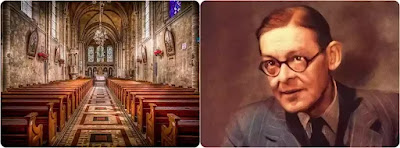Also Read
Murder in the Cathedral was written for a special occasion, namely, the Canterbury Festival. On a superficial level, the play is about "a man coming home, foreseeing that he will be killed and being killed" - that is the gist of the story. The basis of the play is a historical event - the killing of Thomas Becket, Archbishop of Canterbury in the twelfth century. But Eliot is not as concerned with the historical aspect as with the spiritual implication of the event. Thus the story is not as important as the situation presented.
Murder in the Cathedral is not limited to the representation of the killing of Thomas, or even to his finding the true path of martyrdom. The play concerns broader issues. It is basically an exploration of a situation and a quality of life. Eliot visualized the modern world as a spiritually barren wasteland. It seemed a situation in which men had lost faith, and were as engrossed in commercial and material matters that they had simply forgotten God and religion. In this situation, it would be easy to see Becket's death as a "suicide". The play offers a true insight into the implication of Becket's death in that it is a deep-searching study of the significance of martyrdom. Firstly, Thomas Becket is placed in a situation in which he knows martyrdom is the only end awaiting him. But he must become a martyr with a pure will. He has to submerge his will in the Will of God. Secondly, the Chorus representing common humanity has to be spiritually educated. Thirdly, the significance of the martyrdom has to be brought home to the twentieth-century audience.
Eliot has presented Thomas Becket 'as an archetypal figure who wrestles with an archetypal problem, the subtle temptations of the religious conscience when it has set itself up against the State. The conflict the play is between worldly values and spiritual values. Becket is acting on the basis of values other than the worldly ones accepted at the beginning of the play by all the other characters. It is only at the end or the play that the women of the Chorus reach a spiritual plane which they had earlier lacked.
In Murder in the Cathedral Eliot shows how drama can still be an instrument of community - both as an extension of the liturgy play presents the mystery of "suffering" and "action". The characters are of varying degrees of consciousness and they are placed in a situation in which they must make a choice. Thomas makes a choice; the Chorus, and the Knights make a choice about how to interpret the event. The audience is left to make its own choice.
Eliot has returned to the most primitive form of tragedy. The model is the earlier plays of Aeschylus in which, as Professor Murry points out, there is one great situation in which the poet steeps our minds, with one or two sudden flashes of action. The suspense of a great people expecting and receiving the news of defeat in the agony of a besieged city, the Saviour of mankind nailed eternally to the rock - these are all subjects that might be treated in simple choral songs with nothing but words and music. Eliot begins, like the Greek dramatists did, using the chorus to present the background and facts - the veneration paid to the martyr by the church for which he died. His play leads to the words: "Blessed Thomas pray for us". The poor women of Canterbury are prototypes of all those who, throughout the ages will come to implore help from the hero-saint. They are the worshippers at the shrine, the pilgrims to Canterbury, the Christian equivalent of the ritual mourners weeping for the dead god or hero. But the play transcends its origin and occasion and Chorus becomes humanity confronted by the mystery of iniquity and the mystery of holiness.
